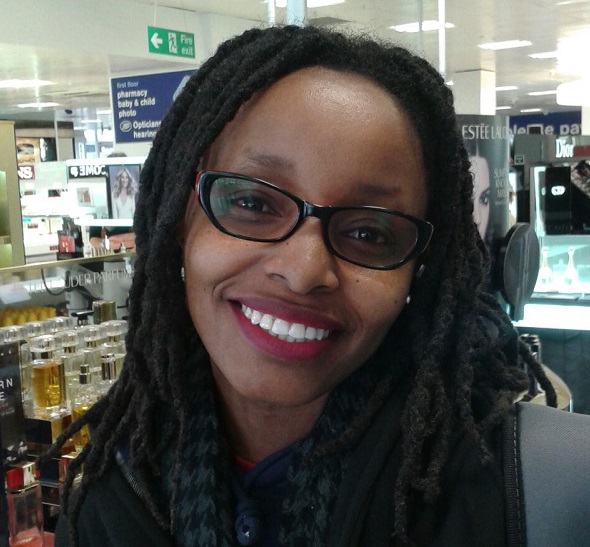
Living with chronic migraine by Scholastica Zakayo
“Normal people don’t have headaches for no reason” those were the words my neurologist used on our first meeting when I told him I had ‘normal’ constant-daily low frequency headaches and episodic migraines.
It took me by surprise as I had suffered headaches for so long, it had become normal. By the time I was visiting the neurologist, I could not remember a day in the preceding two -years that was headache free – even for a second.
I had no idea that a condition like chronic migraine existed. I happened to learn that those of us who suffer from migraines refer to ourselves as migraineurs- such an interesting term, for such a disabling condition.
What is a migraine?
A migraine is a type of headache characterized by recurrent throbbing pain which normally affects one side of the head, and last from two hours up to 3 days. Associated symptoms may include nausea, vomiting, and sensitivity to light, sound, or smell. The pain is generally made worse by physical activity. One in every 5 people (20%) of people who suffer migraines, experience an aura. For me, it is a feeling of numbness on the hands and legs and usually signals to me that a migraine headache will soon occur. Occasionally, an aura can occur with little or no headache following it.
Globally, approximately 15% of people are affected by migraines. It often starts at puberty and is worst during middle age. In some women they become less common following menopause.According to the Global Burden of Disease study, migraine was one of the most common causes of disability in 2015. One uncommon type is the chronic migraine, a disabling heavy headache which lasts for more than 15 days in a month and affects just under 8% of the population.
Migraine experiences are different from person to person – I will tell you a little about what it is like for me.
Meetings are where I experience the most problems. I get very anxious about meetings. I find it difficult to make sense of what is being discussed because of the headaches and my thinking is slowed down. It does not help that I am rather introverted and prefer to be quiet.
I was once asked to take notes during one of the meetings and was in a panic. I couldn’t imagine, taking notes, listening in and talking at the same time. I somehow managed to wing it but such situations still continue to fill me with nerves. I sometimes prepare notes beforehand to enable me make more coherent sentences to present in group meetings.
Even though I have accepted the condition and learning to manage the pain, I find that I am cautious when it comes to making any personal and professional plans. I sometimes cancel or postpone events as a result of the headaches. At times, it feels like I am a prisoner to the migraines. At the end of the day, I want to just shut my eyes and remain in a quiet place.
Chronic migraine is draining. For most chronic migraineurs, the after-migraine symptoms become entangled with the pre-migraine symptoms before the next attack hits until the entire month becomes one long haze of symptoms and pain. I have to acknowledge this energy drain to my system and find ways to energize myself.
But at least I know what I am suffering from. The vast majority of people remain undiagnosed. A diagnosis of migraine can be based on signs and symptoms.
Neuroimaging tests are not necessary to diagnose migraine but may be used to find other causes of headaches in those whose examination and history do not confirm a migraine diagnosis. I have undertaken several neuroimaging tests, ophthalmological tests among other clinical tests. Each time I went for these tests I hoped that they would reveal some treatable condition. I started with head scan in Mombasa, this revealed nothing tied to the headaches.
After several months of daily pains and insomnia, I went to see a neurosurgeon in Nairobi who recommended eye tests. I did four tests with the ophthalmologist who revealed that something at the back of my head was applying pressure on my nerves. I panicked and started researching online what that could mean. My main worry was that perhaps I had an undiagnosed brain tumor.
Four weeks after the eye tests, I was due for a brain scan which I found nerve racking. I also undertook 5 blood tests investigating hormonal problems.
None of the tests were able to pinpoint exactly what was causing these headaches. I did not have any tumours, nor glaucoma.
I am currently going through months of trying different treatments in order to work out which regimen can best control the migraine.
Initial recommended treatment is with simple pain medication such as ibuprofen and paracetamol for the headache, medication for the nausea, and the avoidance of triggers. Simple pain medications no longer work for me, and the triptans family doesn’t work either.
I have spent a lot of research time online searching for information and online support groups. All I have come across are webpages providing clinical information, two sites people writing about their experiences (which can act as support group) and few published articles about migraines (e.g. mental health and chronic migraine).
I have however come to enjoy a very resourceful webpage that was referred to me by my current neurologist. A site that offers practical information to a novel migraineur like me https://www.migrainetrust.org/.
People need to understand that a migraine is not a mere headache, but a severely disabling condition whose symptoms come and go whenever they please. The unpredictability and difficulty in explaining how the condition manifests itself is frustrating enough and someone can feel alone even amidst those who go through the same condition. Keeping off the pain can be a daunting experience especially when trying to control how much you expose yourself to the sun, to windy environment, loud music, buzzing noise, air conditioning in the office or time spent on computers among many other triggers. It always feels like we are ‘knights in a sword fight, fending off enemy after enemy who are encircling and enclosing upon us’.
Despite the daily pain struggles, I have managed to learn my migraine patterns, some of the triggers and ways of dealing with the pain. When the going gets tough, I always try to find a quiet place and close my eyes. If I cannot manage to isolate myself, I sit quietly even if in a group and wait for the pain to subside. I have also learnt to be patient with myself and undertake projects that are manageable and try not to put too much pressure on myself. Exercises like jogging, yoga and Zumba do help although one has to be careful not to overdo on any of these activities because they can trigger a migraine episode. Supportive family, friends, and bosses make it easier to bear the migraines.
***********************************************
Brief Bio:
Scholastica Zakayo is a research Officer and anthropologist working within the Health Systems and Research Ethics department at the KEMRI/Wellcome Trust Research Programme, Kilifi Kenya. She has an MSc in International Health and Tropical Medicine. She hopes that by sharing her experience she can shed some light to those unfamiliar with the condition, and reach out to those going through the same experience and let them know that there many others out there.
Comments
-
-
Scholar
Hi Esther, thank you. I have not tried chiropractic before, I could give it a try during my next visit to Nairobi. Thanks for the recommendation.
-
-
Josiah Kosgei
I suffered chronic migraine for 5 years since 2006- 2011. I had tried types of herbal medicine available and those recommended by specialitists by could not cure. I then found a herbalist who gave me three pieces of herbs and in 2 days i was totally cured of migraines. A 7 year testimony today i can testify
-
Scholar
Wow, that’s very interesting Josiah
-
Onami
Hi? could you connect me to this herbalist? Thanks
-
-
Enyenekere Brown
Your article actually enligten me. But i had a friend who suffered acute migrain, which later visited a Teaching hospital and the doctor advised him to reduce sugar intake. Beside ypu should trust in God and his words because He says there is nothing too hard for Him.
-
Scholar
Thanks Enyenekere, different therapies work for different people. I am yet to find what works best for me. I hope reducing sugar intake worked for your friend.
-
-
Joan ongachi
Your article has given me hope,i thought nobody understood my condition i have had chronic migraine since 2013 and am still battling ways to manage the condition(loud music,too much noise,very strong perfumes,i cannot read in a moving motor vehicle,too mush light)these are some of my triggers,in comes with throwing up,throbbing headache blurry sight,am not able to sleep when attacked.Thanks for sharing your experience.
-
Scholar
Dear Joan, glad to have given some hope. It can be very difficult living with the condition and what makes it worse is its difficulty to manage. I hope you find some relief in the long run (so do I wish the same for myself). Take care.
-
-
Anita
So sorry for what you’ve been through. I’ve been having a daily headache for the last one week and am fed up, cant imagine what you’ve been through.
-
Scholar
Hi Anita, thanks and sorry for the headaches as well. Try to be patient with yourself because daily pain can be frustrating, take a day as it comes and try finding personal ways of coping with the pain. Hope you get relief soon.
-
-
Kibagendi
Hi and thanks for the information. I have been having this recurring headache for a while now and i think i have to go tests to determine the cause. Am so humbled for this wonderful information.
-
Scholar
Hi Kibagendi, Sorry for the recurring headache. Undertaking medical examinations will help rule out a lot of suspicions and ease your worries as well. I would encourage you to go for the tests as soon as you can manage to. Otherwise, hope all goes well for you and that you will find a solution to your recurring headaches.
-
-
Onami
Thanks this is very informative. For me morning sunlight and perfumes are the triggers. I hope to find a solution to this migraines.
-
Scholar
Hi Onami, thanks for reading. And like you, I also hope we find a solution to the migraines.
-
-
Anonymous
Hi Scholastica, thanks for this enlightening article. Went on a google search looking for a support group in Kenya just to find this.
It gives me the courage to know am not alone in this fight. I have struggled with this demon for the last six or so years and am yet to figure out my triggers. Have done a CT scan that gave me relief that I do not have any form of tumor but tired to spend more money that I do not have.
I really want to pursue business school but am afraid I might not make it through. Mainly because of the chronic pains one week after the other that makes it very hard to concentrate. To set things into perspective, I just did my first test run of GMAT with headaches and didn’t perform so well.
-
Scholar
Hi there, Sorry to hear about your struggles with the problem for all those years and worse still, how it has been challenging to proceed with some of your studies because of the debilitating pain- so frustrating. There really is no better answer for you, but what I try do is find what works for me like learning what times I am most productive, and how I can maximize on this- and then maybe take on projects I can handle but not letting the headaches limit my abilities. But, like you have said, it is really difficult just to even think of pursuing further studies- the pressure, the worry of making it through a class, the pain to persevere and concentrate even in a one hour lecture session, all unbearable.
All we need is to have patience with ourselves and figure out what works for us and maximize on that. I am believe you can do well in your studies despite the headaches.
-
Comments are closed.




Esther Juma
Sorry for what you’ve gone through, I know a chiropractic doctor in Hurlingarm called Dr Musimbi Ondeko whose very good with managing migraines, have reffered a number of people suffering from migraines and the feedback was amazing,maybe this an area,you might want to try,best of luck